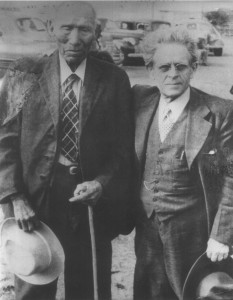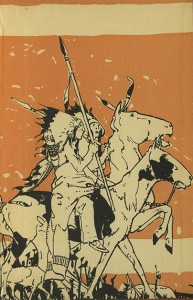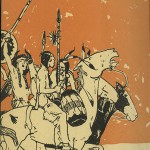John Neihardt taught English at the University of Missouri from 1949 to the early 1960s. His Epic America Course was immensely popular and always had a waiting list for admittance to the course. The Epic America course covered the Song of the Indian Wars and the Song of the Messiah, two of the five parts of the Cycle of the West. It also draws from manuscripts of interviews with Black Elk at Pine Ridge in 1931, which resulted in the book Black Elk Speaks; and Eagle Voice in 1944, which led to the writing of Eagle Voice Remembers.
In the early 60s, the course was video-taped so it could be offered after his retirement from the University. This Course is a re-edited version of the lectures from the Epic America course he taught.

“In 1912, at the age of 31, I began work on the cycle of heroic Songs, designed to celebrate the great mood of courage that was developed west of the Missouri River in the nineteenth century. The series was dreamed out, much of it in detail, before I began; and for years it was my hope that it might be completed at the age of 60–as it was. During the interval, more than five thousand days were devoted to the work, along with the fundamentally important business of being first a man and a father. It was planned from the beginning that the five Songs, which appeared at long intervals during a period of twenty-nine years, should constitute a single work. They are now offered as such.

The period with which the Cycle deals was one of discovery, exploration and settlement–a genuine epic period, differing in no essential from the other great epic periods that marked the advance of the Indo-European peoples out of Asia and across Europe. It was a time of intense individualism, a time when society was cut loose from its roots, a time when old culture was being overcome by that of a powerful people driven by the ancient needs and greeds. For this reason only, the word “epic” has been used in connection with the Cycle; it is properly descriptive of the mood and meaning of the time and of the material with which I have worked. There has been no thought of synthetic Iliads and Odysseys, but only of the richly human saga-stuff of a country that I knew and loved, and of a time in the very fringe of which I was a boy.
 When I have described battles, I have depended far less on written accounts then upon the reminiscences of men who fought in them–not only Indians, but whites as well. For, through many years, I was privileged to know many old white men, officers and privates, who had fought in the Plains Wars. Much of the material for the last two Songs of the series came directly from those who were themselves a part of the stories.
When I have described battles, I have depended far less on written accounts then upon the reminiscences of men who fought in them–not only Indians, but whites as well. For, through many years, I was privileged to know many old white men, officers and privates, who had fought in the Plains Wars. Much of the material for the last two Songs of the series came directly from those who were themselves a part of the stories.
Such intimate contacts with soldiers, plainsmen, Indians and river men were an integral part of my life for many years, and I cannot catalog them here. As for knowledge of the wide land with which the Cycle deals, those who know any part of it well will know that I have been there too.”

